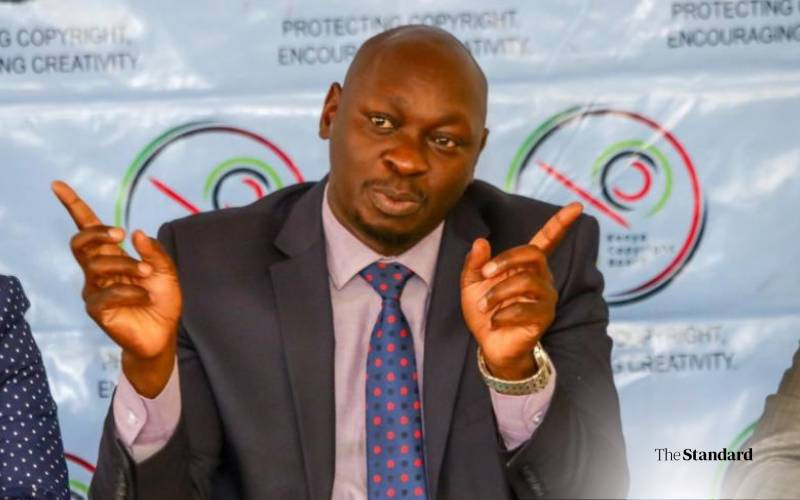
There is nothing fancy about Ken wa Maria’s 2013 breakout hit single Fundamentals, yet it was one of the most demanded songs on the Kenyan entertainment scene last year. From the song’s popularity he commanded fame and raked in a fortune.
Ken wa Maria, the self-styled Eastern Benga star is one of the leading lights in what is commonly termed as ‘River Road music’, having been elected the chairman of local bands sometime back.
Just like many River Road artistes, Ken wa Maria walks into one of the 50 studios downtown Nairobi in the morning where a producer is on standby. In another hour, he records a song, gets it mastered and in the evening, over 300,000 CD’s and audio tapes of the song are ready with distributors ready to buy volumes for distribution in different towns.
He does not need to launch it on YouTube or ask radio and TV stations to hype it, let alone the thought of holding a media launch in one of those luxury joints in Westlands. His fans don’t connect like that.
The singer has more shows that the average Pulse generation showbiz celeb. As a cut-across artiste, he is a household name now riding on fame and fortune.
Having mastered the art, he knows River Road’s magic touch... the somewhat frowned-upon entertainment hub that is the backbone of hundreds of artistes. This is where Esther Wahome got her breakthrough, selling millions of album copies and becoming one of the most successful gospel artistes of all times.




They don’t spend millions to produce their videos or use sophisticated technology such as YouTube and the like to market their songs like the urban kapuka, genge, hip-hop and Afro-fusion celebrities do. The Facebook and WhatsApp vibe is not their thing. They have created a special network for themselves, a million-dollar industry that is hardly noticed.
This team seems to have put the ‘mainstream’ artistes on notice after claiming all the major posts during the annual Music Copyright Society of Kenya (MCSK) elections recently. There is are murmurs that the disgruntled youthful lot is working on an alternative plan to keep afloat and have a hold on the MCSK leadership, a far-fetched wish judging from the revolution going on in River Road.
Beyond nairobi
As showbiz stars start to group together and form associations such as the Hip-hop Hook Up, Music Industry Association of Kenya (Miake) and the recently registered Authors and Performers Association of Kenya (Apake), River Road musicians and Riverwood film makers seems to be playing on a different league, making mass production of movies and music videos with their eyes on the share Nollywood had claimed for years. It is a different ball game all together.
“The thing is, these guys you call celebs pretend to be making a lot of money but they are broke fellows. What percentage of the industry do they control beyond Nairobi? Does sagging trousers and speaking with a ‘twang’ make you a star,” Ken wa Maria once challenged during a Pulse interview.
“Tell your guys (urban showbiz celebs) to come back to reality. They should swallow their pride and start looking at music from a business point of view, not the show-off bit that leaves them broke. Show me the most successful musicians in Kenya right now and I will tell you why River Road rules,” he added.
Musician and producer Titi Solomon who became an instant celebrity in the 90s with his hit single Tangu Tupendane argues that the change in leadership at the music copyright board should send a strong signal to the ‘mainstream’ artistes; whom he claims are often preoccupied with fame and controversies.
“In River Road our sole business is making money,” the rather jovial Solomon tells Pulse.
Whereas over the past few years River Road has been associated with the ‘untouchable’ music piracy cartels; today it is slowly positioning itself as the city’s entertainment hub.
Stay informed. Subscribe to our newsletter
Going down River Road, Pulse meets in excess of 300 registered film producers and more than 50 music production studios all busy, focused in serving a ready market.
Solomon who is the previous owner of Zero8 Studios, now Mercury Studios, says; “At the Simba Centre building alone we have at least 15 music studios and more than 30 other studios along the River Road stretch.”
“These are studios producing all sorts of music; however, with a bias for the live vernacular secular and gospel hymns,” he adds.
The studios charge fair rates and are ever busy unlike the Ogopas and the Califs of this world were modern-day celebs are charged huge amounts to produce a track.
River Road’s entertainment industry is however, not only acclaimed for its vernacular music but also its thriving film industry which is today estimated to be worth Sh60 million according to Riverwood Ensemble.
Kang’ethe Mungai, the Chairman of Riverwood Ensemble, who is also a film director at Kikwetu Productions, says that Riverwood today comprises more than 300 film producers with an equal number of film production houses.
Noticeable is that Government agencies are taking keen interest in the films churned out of Riverwood. Eva Mbuni, the corporate communication officer at the Kenya Film Classification Board (KFCB) tells Pulse that Riverwood is so far the largest film production unit in the country, several short films are churned here on a daily basis.
Pulse also learnt that Riverwood pays out between Sh900,000 to Sh1.2 million monthly in salaries.
The allure of quick cash in Riverwood is now attracting mainstream actors who in the past wouldn’t take up roles in Riverwood films as they were deemed to be of low quality.
Mainstream
Brian Munene who is an actor and an award-winning scriptwriter says; “I think the conversation should not be mainstream films versus Riverwood, nobody is making as much movies as they should. Riverwood filmmakers have an edge over ‘mainstream’ filmmakers as they decided to work together.”
According to Andrew Owuor, former Marketing Manager at the Riverwood Academy Awards, who spoke to Pulse in an earlier interview, Riverwood’s film producers prefer producing drama series because they are now deemed more profitable.
Even with this boom, Riverwood films and music have always been thought of as low quality productions.
“Many still perceive our productions as bad quality films. However, Riverwood productions such as Housemates (aired on K24) and Maisha Bure (aired on QTV) are a clear indication that our quality is good,” Mungai differs.
Business licences and permits are still a major challenge in the creative in River Road.
“The film permit regime in Nairobi is so far the most expensive. Many producers have therefore resorted to shooting inside houses or limiting themselves to a particular street to avoid extra charges,” Omondi observes.
A film permit in Nairobi ranges from Sh2,000 to 4,000 a day and one has to be licensed by the Department of Film Services at Sh12,000 and thereafter pay for a permit worth Sh20,000 to shoot a film. Besides, one is also expected to pay Sh100 per minute for the film to be classified,” Mungai laments. The working budget for a short film in Riverwood costs between Sh50, 000 to Sh100,000.
Many films produced in Riverwood are however not classified, and this according to Mbuni, has led to the production of more pornography films.
“For several years, producers from Riverwood Ensemble shunned working with the board for several reasons including harbouring a negative attitude towards the Government’s function as a regulator. More specifically, they feared being arrested and getting victimised,” Mbuni notes.
She however, adds that the Board has come up with incentives to encourage local producers to submit their films for rating by waiving a percentage of the total amount required for classification. Such amount can also be paid over an agreed period.
While piracy remains a major challenge in the film distribution, Owour points out that distribution of genuine films has been successful because the genuine copies are sold at prices that match the pirated copies, removing the extra advantage the latter used to have.
“If you do not get back your profits within one week after releasing a film then you have split your money with piracy,” Mungai adds.
Mbuni further notes that Riverwood is not River Road. Therefore, any pornographic films which have been produced along River Road are not necessarily produced under Riverwood.
Popular music
Ohanglaman Makadem seemed happy when River Road musicians voted in their own during the MCSK election, according to local media.
“What’s mainstream? Music listened to by a few urban guys especially in Nairobi? We have reached a level where the tag ‘Kenyan artiste’ according to media is a reserve of the celebs from uptown and not River Road or other players. This is why I am so happy it happened,” he is quoted as saying.
Popular music producers in River Road include Kimondolo, JaCity, Warigia, Githingithia, Nimu, Wandahuhu, Pengle, Machang’i and Kihenjo.
Solomon adds in that musicians along River Road can sell hundreds of thousands of VCDs through the River Road distribution channel. “Mainstream artistes would despise some of our artistes who sell CDs from their Probox boot. What they don’t know is that these artistes can sell over 300 VCDs at Sh100 each, every day,” Solomon observes.
River Road celebrated stars, the likes of John De Mathew or Ken wa Maria, are said to demand nothing less than Sh200,000 per show.
Popular music studios in River Road are often fully booked for a month or two, Pulse learnt. Solomon, who was the first person to launch a digital studio in River Road, says that a single song recording costs between Sh3,000 to Sh5,000.
“For a live recording, a musician would part with Sh1,000 per hour. For a live session, an artiste only needs to approach the studio, select back-up artistes - who are readily available - and after three days of rehearsal they would hit the studio to record an eight-song album,” Solomon adds.
At most studios, you step in and step out with your song after three hours, but live music takes three days.
“In most cases, a producer would pay up to Sh2 million for the copyright of an eight-song album. Once the money is paid, the artiste claims nothing from the sale of the music. The artiste would earn his or her dues from shows and club performances,” says Solomon.